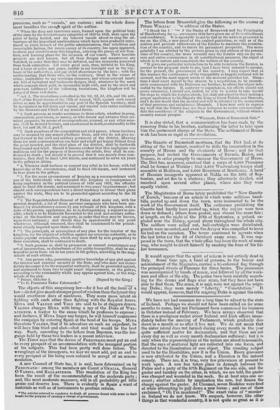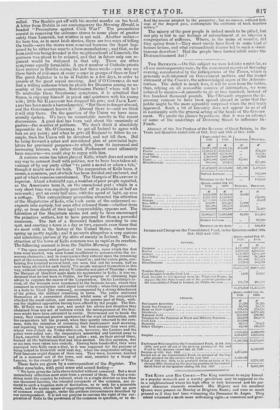We have not had occasion for a long time to
advert to the state of Ireland. Perhaps we should not have been called on for some months to come, had not Parliament been summoned for business in October instead of February. We have always observed that there is a prodigious racket about Ireland and Irish affairs imme- diately before the meeting of Parliament, which gradually dies i down n a month or so after it has met. We do not mean that the sister island does not furnish during every month in the year quite sufficient matter for declamation, and that there are not every day as well as every month declamation sufficient; but it is only when the representatives of the nation are about to assemble, that the rays of scattered light are collected. into one focus, and directed to the illumination of one object. The standing .subject used to be the Disabilities, now it is the Union. Every grievance is now attributed to the Union, and a Disunion' is the natural remedy. There are, it is: true, very few grievances at present to i work upon. A row has taken place n .Armagh between the Police and a party of the 87th Regiment on the one side, and the gaoler and turnkey on the other, in which,. we are told, the. gaoler was charged and wounded in the neck. So at -least says one ac- count; another admits by implication the row, but denies the -charge. against the gaoler. At Clonmel, seven Rockites were fired at while attempting to Pull down a pew house ; and one of them exclaimed, ," Oh I'm murdered!" The exact value of "murder" in Ireland we do not know. We .suspect y however,- like .other things in that wonderful country, it is not quite so great as it is called. The Rockite got off with his mortal murder on his head. A letter from Dublin.m our contemporary the Morning Herald, is headed " Precautions against Civil War V' The precautions consist in removing the ordnance stores to some place of greater safety than Limerick, but whither is not said. Another notice- for here too, as in most Irish stories, there are two ways of telling the truth-says the stores were removed because the depot hap- pened to be rather too near to a ham-manufactory ; and that, so far from civil war being dreaded in the neighbourhood of Limerick, the garrison was about to be reduced, and that in future only one re- ailment would be stationed in that city. There are other symptoms equally formidable. A great number of Catholic priests have arrived in Dublin during the last three weeks-you may see these birds of evil omen at every corner in groups of three or four! The great Agitator is to be in Dublin in a few days, in order to preside at the great repeal meeting. And if O'CorinvELL do not find a willing audience when he pleads for Disunion among an as- sembly of his countrymen, Sanctissime Patrici! where will he ? To neutralize these threatening symptoms, it is admitted that SHEIL is enjoying himself in peace and quietness with his young wife; little Sir HARCOLTRT has dropped his pen ; and JACK ?JAW- LESS has been made a barrackmaster. "But there is danger abroad, and the Government knows it." Abroad there is-and we think it will stay there. On the question of the Union we have occa- sionally spoken. We have no remarkable novelty in the recent discussions. A good deal has been said about the unanimity of parties-the number of petitions. We don't think it absolutely impossible for Mr. O'CONNELL to get-all Ireland to agree with him on any point; and when he gets all England to follow its ex- ample, then the Union will be dissolved, and not till then. Did he bring forward a sober and considered plan of provincial legis- lature for provincial purposes-to which, from its increased and increasing labours, we rather think Parliament must ultimately have recourse-we could stop to argue with him.
A curious scene has taken place at Kells, which does not seem in any way to connect itself with politics, nor to have been taken ad- vantage of by any party either "to point a moral or adorn a tale," though it might serve for both. The corporation of Kells have, it seems, a common, part of which has been divided and enclosed, and part of which remains unreclaimed. The Marquis of HEADFORT is superior. About a fortnight ago, a number ofpoor people squatted, as the Americans term it, on the unenclosed part ; which in a very short time was regularly parcelled off in paddocks of half an acre each ; and on every half acre, with the speed of light, up rose
a cottage. This extraordinary proceeding attracted the attention of the Magistrates of Kells, who took some of' the unlicensed oc-
cupants into custody, but soon after released them-whether from pity, or from disubt of their legal responsibility, appears not. The toleration of the Magistrate seems not only to have encouraged the primitive settlers, but to have procured for them a powerful accession. The fact of a thousand families crowding to one spot, and erecting a town in a day or two, exceeds even those that
we meet with in the history of the United States, where towns spring up pretty rapidly; and it presents altogether a very curious and interesting picture of the state of society in Ireland. The de- struction of the town of Kells common was as rapid as its erection. The following account is from the Dublin Morning Register.
"The open unenclosed portion of the common, upon which the first huts were erected, was soon found insufficient to accommodate the nu- merous claimants ; and in consequence they entered upon the remaining part of the common, which had been fenced in ; and the entire plain, con- taining five hundred acres at least, was soon laid out for houses, half an acre being allotted for each family. The people occupied themselves in this way, without interruption, during Wednesday and part of Thursday ; when the Marquis of Headfort again made his appearance in Kells ; it was un- derstood that he had been in Dublin, for the purpose of obtaining legal advice to regulate the course of the Corporation. On his Lordship's ar- rival, all the freemen were summoned to the Sessions-house, where they remained in consultation until about four o'clock ; when they proceeded in a body to Lloyd [the common, accompanied by a strong detachment of the police, the military remaining in town. The police stationed themselves at a convenient distance, whilst some of the corporators attacked the small cabins, and unroofed the greater part of them, with- out the slightest opposition having been offered by the people. The Rev. Mr. M'Evoy was on the spot, and under his advice and direction they abstained from any act of violence which the intemperance of the free- men might have been calculated to excite. Determined not to break the peace, they remained passive spectators of the work of destruction, until the corporators left the ground, when they quietly returned to the com- mon, with the intention of resuming their employment next morning, and repairing the injury sustained, in the best manner they were able. About two o'clock on Friday afternoon, however, the Lancers and the police were called out; the corporators assembled and hurried away to Lloyd, escorted by the military and police ; and, on their arrival there, burned all the habitations that had been erected. On this occasion, five or six men were taken into custody. Having been handcuffed, they were conveyed into Kells upon a dray, as it was supposed for the purpose of being lodged in Bridewell until next day, when the magistrates sitting in Petit Sessions might dispose of their case. They were, however, hurried off in a moment out of the town, and sent, escorted by a troop of Lancers, to the county gaol of Trim.
These facts are given by a correspondent of the Register. The editor concludes, with good sense and sound feeling- " We have given the facts above detailed without comment. But a most melancholy reflection must arise from a perusal of them. To what a con-
dition must the country be reduced, when in a single district no less than one thousand families, the intended occupants of the common, are re- duced to such a hopeless state of destitution, as to seek for a miserable
abode, and the scanty means of supporting existence, which half an acre of common could supply, under the perilous circumstances described by our correspondent. It is not our purpose to canvass the right of the cor- poration of Kells to the possession of the common in question, or to de-
fend the course adopted by the peasantry ; but we cannot, without feel- ings of the deepest pain, contemplate the existence of such hopeless misery." •
The misery of the poor People is indeed much to be pitied, but our pity is lost in our feelings of astonishment at so singular a congregation of sufferers. *here, in the name of wonder, did they spring from ?-They must surely have lived in some kind of houses before, and what extraordinary chance led to suela a simul- taneous desertion ? Had the people been turned adrift under the Disfranchisement Act ?



























 Previous page
Previous page